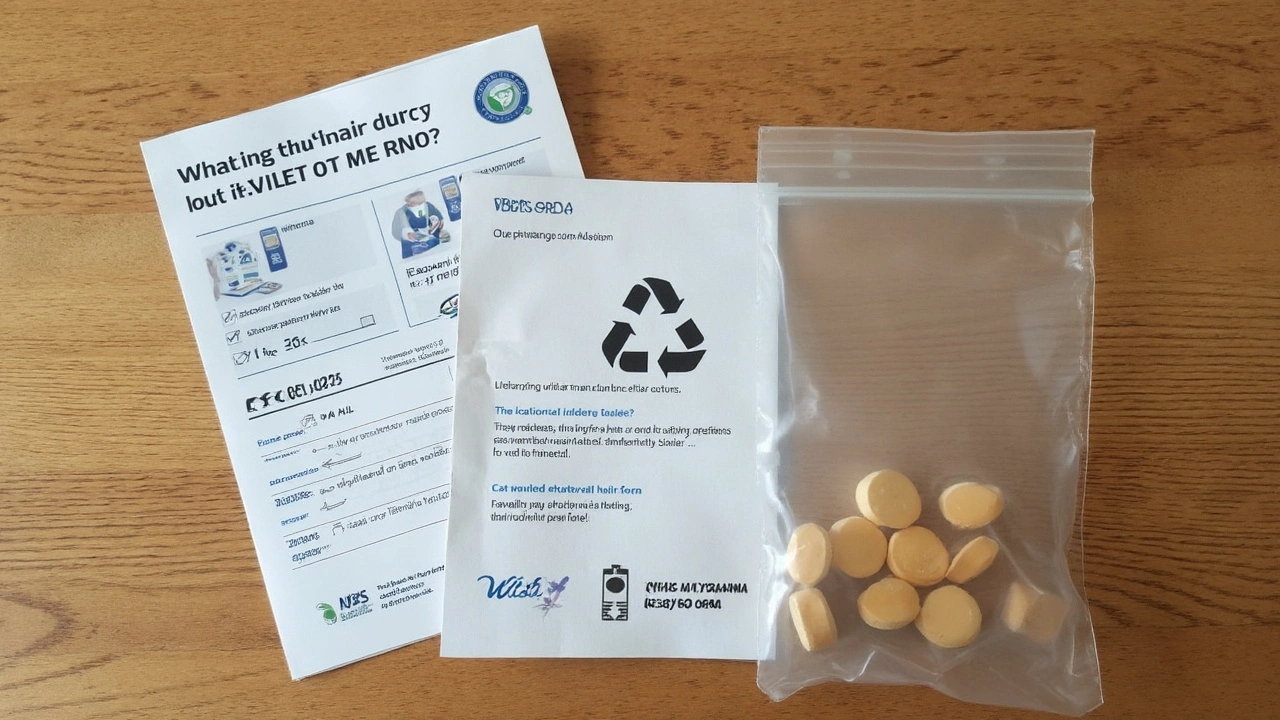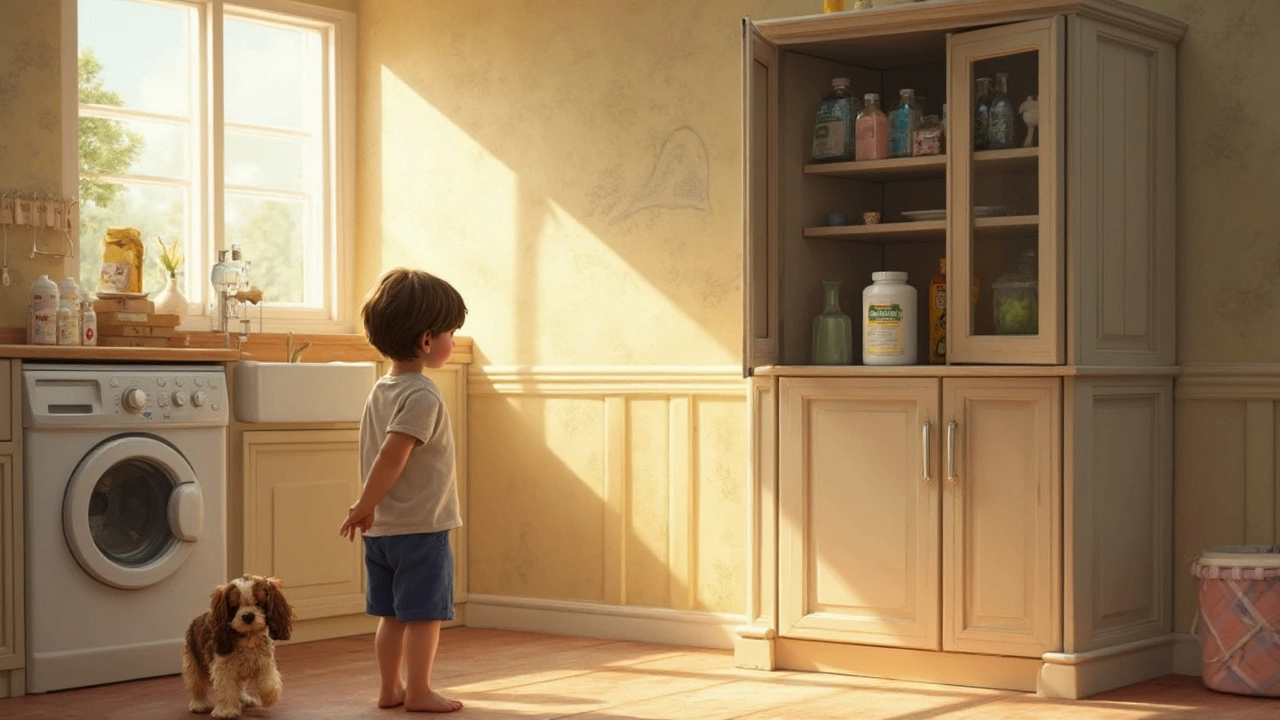Ever shoved a box of pills at the back of your bathroom cabinet and forgotten about it? You’re not alone. With tinidazole, though, how you store it can make a surprisingly big difference—it keeps the medicine effective and keeps your household safe.
Tossing tinidazole somewhere warm or damp (like a steamy bathroom) is a no-go. Heat, light, and moisture break down the drug, which means you can’t count on it working when you need it. You want somewhere cool, dry, and preferably up high or locked away if you’ve got kids or curious pets around.
And what about leftovers? Don’t just flush them or toss them in the kitchen trash. They can end up in water supplies or in the wrong hands. There are better, safer ways to get rid of unused medications—options that protect your family and the environment. Stick around for tips that could save you hassle, or even a trip to the ER.
- Tinidazole Storage Basics
- Keeping Tinidazole Away from Kids, Pets, and Heat
- When Tinidazole Expires: Signs and What to Do
- How to Dispose of Tinidazole Safely and Legally
Tinidazole Storage Basics
Let’s get to the point: tinidazole isn’t picky, but it does have some rules if you want it to work right. The medicine’s directions—and big pharmacy chains—say tinidazole should be kept at room temperature, between 20°C and 25°C (68°F to 77°F). No sweating it out in your glove box and definitely no chilling next to the milk in your fridge. Extreme temperatures can mess with its strength, and you don’t want to end up with a dud.
Humidity is another thing that can ruin tinidazole. Bathrooms might seem like an easy spot to stash medicine, but all that steam from showers can make tablets get mushy or clump together. Instead, grab a spot in a closet, shelf, or drawer away from direct sunlight and moisture.
Here's a checklist that makes safe medication storage super simple:
- Keep tinidazole in its original packaging. The bottle or blister packs protect the pills from light and air.
- Store it out of reach—think high shelves or a locked container if kids or pets are in the house.
- Don’t split up doses or mix with other meds. It’s easy to mix up which pill is which (been there, done that).
- Check the label for any special storage notes from your pharmacy—sometimes there are extra tips.
- Make sure the cap is tight after every use. Moisture sneaks in fast!
One quick fact: According to a Consumer Reports survey from 2022, over 50% of people store medication in bathrooms—not the best plan. The odds of pills losing their punch jump higher if you ignore storage instructions.
Keeping Tinidazole Away from Kids, Pets, and Heat
This might sound obvious, but you’d be surprised how often people overlook it—tinidazole is just as risky for little ones or pets as any other prescription drug. It can look like candy to a toddler or something to chew on for a curious dog. Swallowing just a couple of pills meant for adults could send a child or pet straight to the emergency room.
So, where’s the best spot to store tinidazole? Rule out low drawers, purse bottoms, or open shelves. Aim for a spot that checks these boxes:
- High up, way out of reach of kids and pets
- In a cabinet with a child lock, if possible
- Away from light—direct sunlight can mess with how potent the pills stay over time
- Nowhere near where you eat, cook, or store food—you never want an accidental mix-up
Here's a breakdown of where most people say they keep their meds versus where experts recommend:
| Storage Spot | How Common | Recommended? |
|---|---|---|
| Bathroom cabinet | 52% | No (too damp and warm) |
| Kitchen cupboard | 21% | No (too close to heat and food) |
| Bedroom drawer (unlocked) | 15% | No (easy for kids/pets) |
| High closet shelf (locked) | 12% | Yes |
You also want to keep tinidazole away from anything that gets hot—heaters, stoves, cars in the summer, or even the windowsill. Most medicines are happiest around room temperature, which usually means between 20°C and 25°C (about 68°F to 77°F). Anything hotter or more humid, and you risk ruining the tablets long before the expiration date.
If you need to take your meds with you, don’t leave them in a parked car. Temperatures in cars skyrocket even on mild days, and that can mess up your tinidazole fast. Toss them in a small, insulated pouch and keep them with you instead.

When Tinidazole Expires: Signs and What to Do
Every box or bottle of tinidazole comes stamped with an expiration date, usually somewhere on the label or blister pack. This date isn’t a random guess—it’s tested by drug makers to show when the medicine stays fully effective. After that date, you can’t be sure tinidazole will work—and sometimes, an expired medicine can even become risky to take.
Not all meds change in look or smell when they’re past their prime, but there are clear things to watch for:
- Check the expiration date first. It usually appears as “EXP” followed by a month and year.
- If the tinidazole tablets look discolored, crumbly, or have a weird smell, don’t risk it.
- Broken or leaking packaging? The medicine is no longer safe, even if the date hasn’t passed.
There’s a real reason to stick to these rules. According to the FDA, most drugs lose strength after they expire. With tinidazole, using it too late could mean your infection doesn’t clear up or might even get worse because you aren’t getting a full dose.
| Check When | What to Look For | What to Do |
|---|---|---|
| Before Use | Expiration date, tablet appearance, packaging condition | Use only if everything looks right |
| After Expiry | Past expiration date or any tablet changes | Don’t take it—dispose of safely |
If you spot anything off or if the date has passed, don’t second-guess. Set it aside and prep it for disposal the smart way, which I’ll explain further down. Better to grab a new prescription than risk your health with old meds.
How to Dispose of Tinidazole Safely and Legally
If you’ve got leftover tinidazole sitting around, you can't just toss it in the trash or flush it down the toilet. Medications dumped this way often end up in water supplies or, worse, get misused by someone who finds them.
The FDA and EPA both recommend safer ways. Most U.S. pharmacies now offer free drug take-back programs, usually in the form of a bin or kiosk right inside the store. Just drop off your leftover tinidazole—no questions asked. Some police stations and clinics do this too. Check if your local community runs a "Drug Take Back Day," which happens a couple of times each year and lets anybody safely unload unused meds.
Can’t get to a pharmacy? Don’t panic. There’s a simple home method for disposing of tinidazole:
- Take the pills out of their bottle.
- Mix them—don’t crush—with something gross and unappealing, like used coffee grounds or cat litter.
- Put that mess in a sealed bag or container. This stops anyone or any animal from fishing them out of the garbage.
- Throw the bag in your regular trash—not the recycling.
Avoid flushing unless the pharmacy, label, or your waste service says it’s okay. Tinidazole isn’t on the FDA flush list as of today, so stick to take-backs or trashing with unappealing material.
Here’s a quick peek at why proper disposal matters:
| Disposal Method | Risks | Better Option? |
|---|---|---|
| Flushing | Water pollution, affects fish and plants | No |
| Kitchen trash (no mixing) | Kids, pets, or strangers can find it | No |
| Take-back program | None—safe for all | Yes |
| Mixed with coffee grounds/litter | Low risk | Yes (if no take-back) |
One last tip: always scratch out your personal info on medicine labels before tossing out empty tinidazole bottles. Some folks forget, but identity theft is real—don’t make it easy.


Write a comment